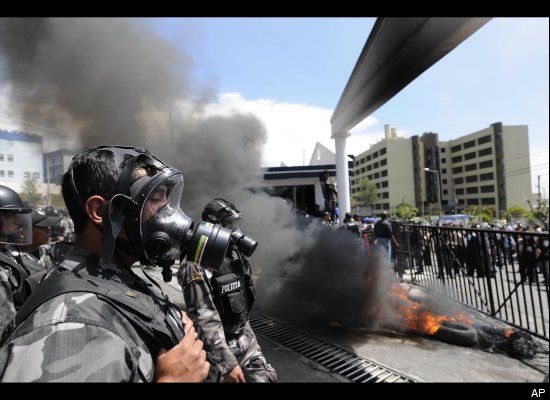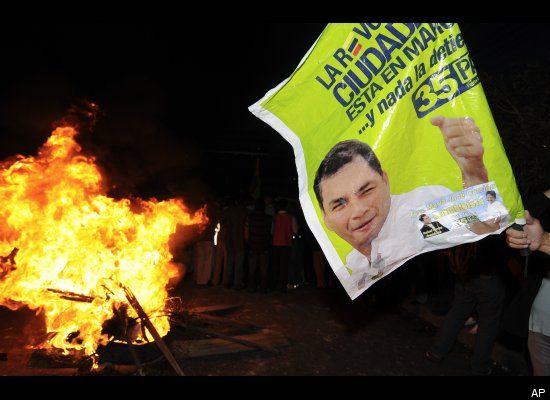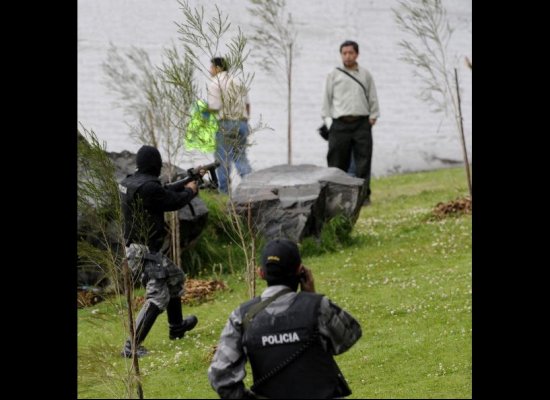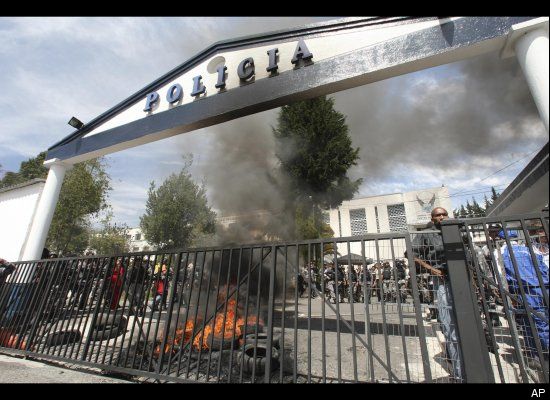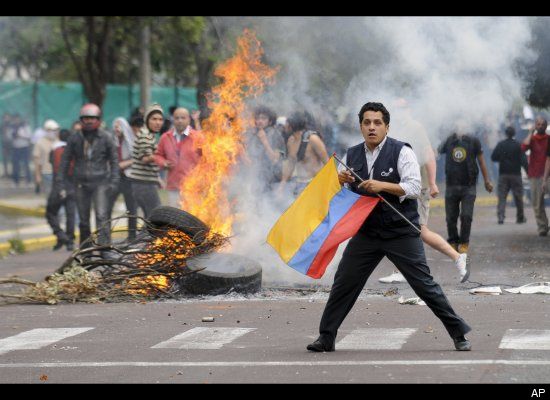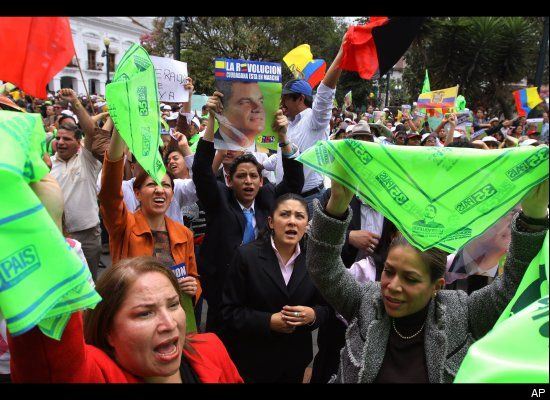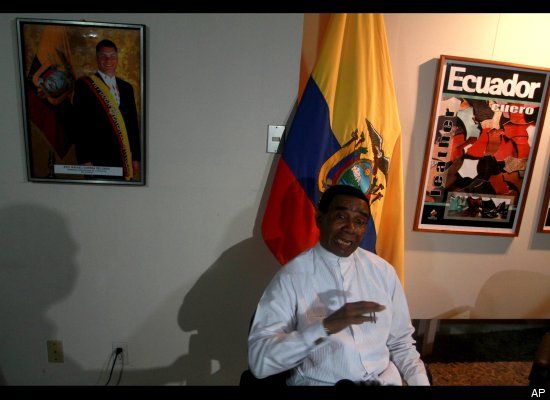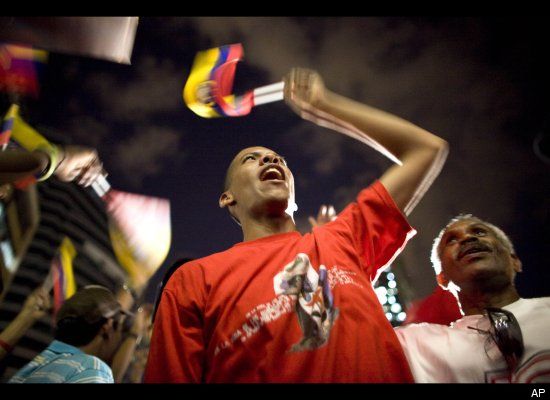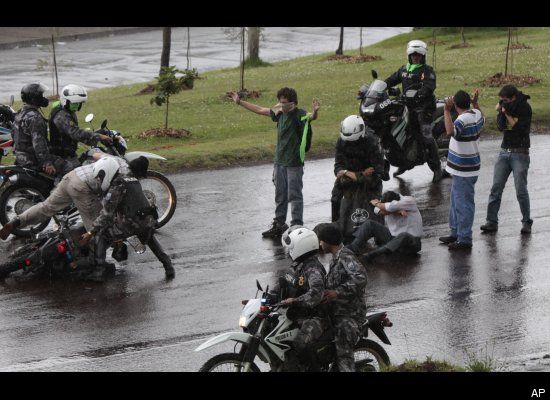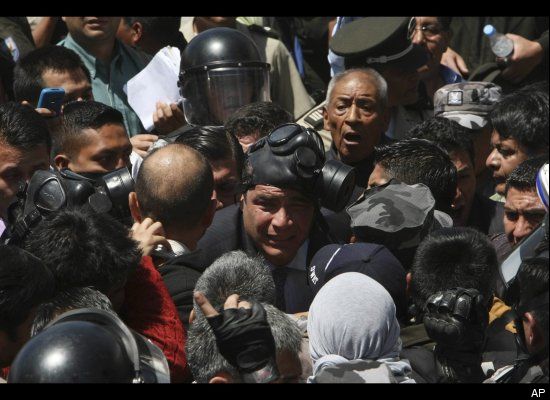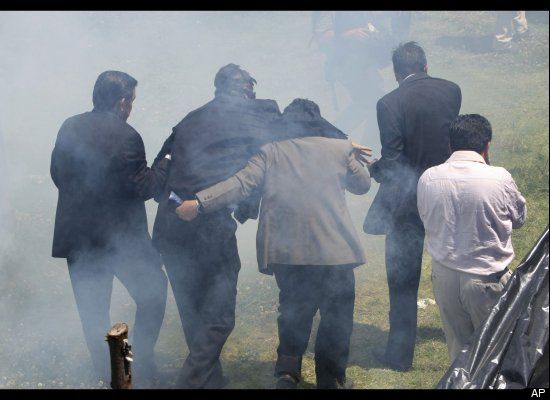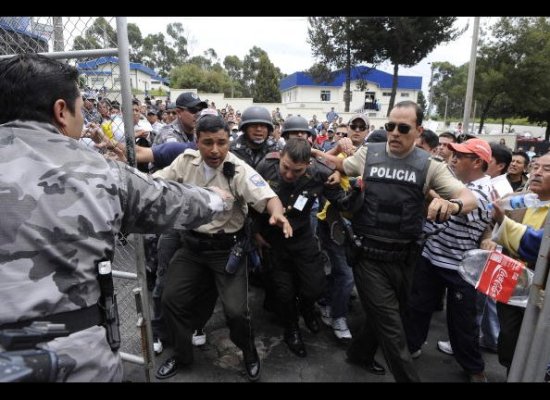Kitomai
JF-Expert Member
- May 21, 2009
- 1,060
- 281
Correa addresses crowd after army returns him to presidential palace
QUITO, Ecuador Soldiers firing concussion grenades and automatic weapons rescued Ecuador's president from a hospital where he had been trapped by rebellious police Thursday for more than 12 hours.
President Rafael Correa appeared on the balcony of the presidential palace shortly afterward and addressed an adoring crowd.
"Believe me that when I was freed and they told me that there was at least one policeman fallen, I cried, not out of fear, but sadness," he said.
Local media reported at least two deaths from the rescue mission.
Correa had been trapped in the hospital where he was treated after being tear-gassed earlier Thursday in a confrontation with hundreds of police angry over a law that would cut their benefits.
In the rescue mission, at least one soldier was seen hit by gunfire and tumbled down a small embankment.
Correa appeared to have been removed in a vehicle by soldiers.
Rebellious officers earlier Thursday plunged the country into chaos by roughing up Correa, shutting down airports and blocking highways in a nationwide strike. Correa's supporters turned out in large numbers and clashed with police into the night.
Correa has been supported by the military command.
Earlier, at least one person was killed and six injured in clashes between police and supporters of Correa outside a police hospital where the leader was being treated, the security minister said.
Venezuelan channel Telesur shows Ecuadoran troops confronting rebel police officers Thursday as they advance toward Quito's police hospital where President Rafael Correa has sought refuge as rebel troops and police staged a coup.
Earlier, incensed officers shoved Correa around and pelted him with tear gas and water when he tried to speak at a police barracks in the capital. Correa, 47, was hospitalized after being nearly asphyxiated by the tear gas.
Correa later declared a state of siege and said he was considering dissolving a deadlocked Congress. Its a coup attempt," he said in an interview with Radio Publica de Ecuador.
Hours after Correa was roughed up, and surrounded by dozens of insurgent cops outside the hospital, the president declared himself "practically captive."
He said he was negotiating with the police insurgents, but he vowed to leave either "as president or as a corpse."
The state of siege puts the military in charge of public order, suspending civil liberties and allowing soldiers to carry out searches without a warrant.
President Rafael Correa
1. First elected in 2006 promising a "citizens' revolution" to better distribute natural resources, curb corruption.
In 2008, Correa defaulted on billions of dollars of foreign debt he declared illegal.
Correa backed the re-writing of Ecuador's constitution to tilt the balance of power toward the executive, and easily won re-election under the new charter in 2009.
His pugnacious style has been popular among many Ecuadoreans. Others, though, have grown weary of hearing him harangue rivals.
(Source: Reuters)
Peruvian President Alan Garcia ordered the closure of his country's borders with Ecuador and expressed its support to Correa's administration.
Chaos
Hundreds of officers involved in the insurrection took over police barracks in Quito, Guayaquil and other cities. They also set up roadblocks out of burning tires that cut off highway access to the capital.
Schools shut down in Quito and many businesses closed due to the absence of police protection.
Looting was reported in the capital where at least two banks were sacked and in the coastal city Guayaquil. That city's main newspaper, El Universo, reported assaults on supermarkets and robberies due to the absence of police.
The U.S. Embassy issued a message warning U.S. citizens of a "nationwide strike by all levels of police, including military police." It warned them to "stay in their homes or current location, if safe."
A State Department spokesperson confirmed that there were several American citizens at the airport in Quito, but said that "they are not in immediate danger."
"The area surrounding our embassy is calm, but we are closely monitoring what is happening on the ground there," State Department spokesperson P.J. Crowley said.
Correa was shouted down and pelted with water and other objects as he tried to speak with a group of police protesters.
"If you want to kill the president, here he is! Kill me!," said Correa, refusing the back down.
The Quito newspaper La Hora quoted the armed forces chief, Luiz Gonzalez, as saying that the military was loyal to Correa. However the National Assembly building was occupied by striking police.
The striking police were angered by a law passed by Congress on Wednesday that would end the practice of giving members of Ecuador's military and police medals and bonuses with each promotion. It would also extend from five to seven years the usual period required for before a subsequent promotion.
"They are a bunch of ungrateful bandits," Correa said of the protesters. "No one has supported the police as much as this government," he told reporters
QUITO, Ecuador Soldiers firing concussion grenades and automatic weapons rescued Ecuador's president from a hospital where he had been trapped by rebellious police Thursday for more than 12 hours.
President Rafael Correa appeared on the balcony of the presidential palace shortly afterward and addressed an adoring crowd.
"Believe me that when I was freed and they told me that there was at least one policeman fallen, I cried, not out of fear, but sadness," he said.
Local media reported at least two deaths from the rescue mission.
Correa had been trapped in the hospital where he was treated after being tear-gassed earlier Thursday in a confrontation with hundreds of police angry over a law that would cut their benefits.
In the rescue mission, at least one soldier was seen hit by gunfire and tumbled down a small embankment.
Correa appeared to have been removed in a vehicle by soldiers.
Rebellious officers earlier Thursday plunged the country into chaos by roughing up Correa, shutting down airports and blocking highways in a nationwide strike. Correa's supporters turned out in large numbers and clashed with police into the night.
Correa has been supported by the military command.
Earlier, at least one person was killed and six injured in clashes between police and supporters of Correa outside a police hospital where the leader was being treated, the security minister said.
Venezuelan channel Telesur shows Ecuadoran troops confronting rebel police officers Thursday as they advance toward Quito's police hospital where President Rafael Correa has sought refuge as rebel troops and police staged a coup.
Earlier, incensed officers shoved Correa around and pelted him with tear gas and water when he tried to speak at a police barracks in the capital. Correa, 47, was hospitalized after being nearly asphyxiated by the tear gas.
Correa later declared a state of siege and said he was considering dissolving a deadlocked Congress. Its a coup attempt," he said in an interview with Radio Publica de Ecuador.
Hours after Correa was roughed up, and surrounded by dozens of insurgent cops outside the hospital, the president declared himself "practically captive."
He said he was negotiating with the police insurgents, but he vowed to leave either "as president or as a corpse."
The state of siege puts the military in charge of public order, suspending civil liberties and allowing soldiers to carry out searches without a warrant.
President Rafael Correa
1. First elected in 2006 promising a "citizens' revolution" to better distribute natural resources, curb corruption.
In 2008, Correa defaulted on billions of dollars of foreign debt he declared illegal.
Correa backed the re-writing of Ecuador's constitution to tilt the balance of power toward the executive, and easily won re-election under the new charter in 2009.
His pugnacious style has been popular among many Ecuadoreans. Others, though, have grown weary of hearing him harangue rivals.
(Source: Reuters)
Peruvian President Alan Garcia ordered the closure of his country's borders with Ecuador and expressed its support to Correa's administration.
Chaos
Hundreds of officers involved in the insurrection took over police barracks in Quito, Guayaquil and other cities. They also set up roadblocks out of burning tires that cut off highway access to the capital.
Schools shut down in Quito and many businesses closed due to the absence of police protection.
Looting was reported in the capital where at least two banks were sacked and in the coastal city Guayaquil. That city's main newspaper, El Universo, reported assaults on supermarkets and robberies due to the absence of police.
The U.S. Embassy issued a message warning U.S. citizens of a "nationwide strike by all levels of police, including military police." It warned them to "stay in their homes or current location, if safe."
A State Department spokesperson confirmed that there were several American citizens at the airport in Quito, but said that "they are not in immediate danger."
"The area surrounding our embassy is calm, but we are closely monitoring what is happening on the ground there," State Department spokesperson P.J. Crowley said.
Correa was shouted down and pelted with water and other objects as he tried to speak with a group of police protesters.
"If you want to kill the president, here he is! Kill me!," said Correa, refusing the back down.
The Quito newspaper La Hora quoted the armed forces chief, Luiz Gonzalez, as saying that the military was loyal to Correa. However the National Assembly building was occupied by striking police.
The striking police were angered by a law passed by Congress on Wednesday that would end the practice of giving members of Ecuador's military and police medals and bonuses with each promotion. It would also extend from five to seven years the usual period required for before a subsequent promotion.
"They are a bunch of ungrateful bandits," Correa said of the protesters. "No one has supported the police as much as this government," he told reporters


